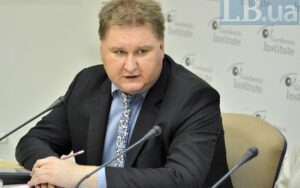
Deputy Prime Minister for European and Euro-Atlantic Integration of Ukraine Taras Kachka has met with civil society experts for the second time in a week to discuss preserving the full functionality of the law-enforcement and anti-corruption systems.
According to the Office of the Deputy Prime Minister, the key issue on the agenda is the discussion of the draft law No. 13533 on amendments to the Criminal Procedure Code of Ukraine and some legislative acts of Ukraine on strengthening the powers of the National Anti-Corruption Bureau of Ukraine (NABU) and the Specialized Anti-Corruption Prosecutor’s Office (SAP) submitted by the President of Ukraine Volodymyr Zelensky to the Verkhovna Rada.
“Thank you for your willingness to open dialog and cooperation. Thanks, in particular, to your expertise and preliminary consultations it was possible as quickly as possible to work out a draft of legislative changes aimed at responding to the challenges and ensure the institutional independence of the anti-corruption system,” – quotes Kachka press service.
He emphasized that such interaction between the public sector and civil society is already becoming systemic, and noted that further regular coordination with representatives of civil society is planned.
It is noted that during the meeting the parties also discussed the issues of realization of transformations provided for by the Roadmap in the field of the rule of law – in particular related to the further functioning of law enforcement agencies.
As reported, on July 24, President Volodymyr Zelensky introduced a bill to the Verkhovna Rada regarding the powers of NABU and SAP.
BILL, NABU, САП, Тарас Качка

On Friday, the multinational military exercise Agile Spirit began in Georgia, which is being held for the twelfth time. The exercise is being held at the Krtsanisi base, where the NATO-Georgia Joint Training and Evaluation Center is located.
The Agile Spirit 2025 exercise is being held in two countries – Georgia and Turkey – to help strengthen regional cooperation, according to the Georgian Ministry of Defense.
The exercises began in Turkey on July 21 with a joint airborne operation by the United States and Turkey. In addition to the military of Turkey, the United States, and Georgia, the military of eight other countries will take part in the exercises that opened in Georgia.
At the opening ceremony, General Terry Tillis, commander of the 7th U.S. Army Training Command in Europe and Africa, said that “this is a strategic exercise that allows for increased interoperability between military personnel from different countries.”
.

Switzerland is maintaining its level of involvement in helping Ukraine with humanitarian response despite the global recession in donor support, said Serge Umov, Head of Humanitarian Aid in Ukraine at the Swiss Agency for Development and Cooperation.
“As for Switzerland, I am pleased to announce that we are not reducing our humanitarian commitments. Our assistance is not as large as that provided by the United States and other European partners. But we are maintaining our involvement for at least the next few years. We do not plan to reduce our efforts to provide humanitarian assistance to Ukraine,“ said Serge Umov during a roundtable discussion titled ”Humanitarian Action in War: Protection of Personnel, Innovation and Influence on World Politics” at Interfax-Ukraine.
At the same time, according to the representative of the Swiss Agency, the current crisis opens up opportunities to rethink approaches to humanitarian response.
“We will need, and we are already doing, to change some things in our approaches and the way we operate. Every crisis also opens up new opportunities,” he added.
He called localization of humanitarian aid and support for the capacity of Ukrainian organizations one of the priorities of the conditions.

Serbia has decided to repatriate all its gold reserves stored abroad and transfer them to the territory of the country. This is reported by Bloomberg agency, citing sources in financial circles. The total value of assets is estimated at about 6 billion dollars at current market prices.
According to the agency, Serbia will be the first country in Eastern Europe to decide on the full return of physical gold reserves from such traditional depositories as Great Britain, Switzerland and the United States.
The decision comes amid increasing geopolitical instability, inflationary pressures and uncertainty in global markets. Serbian authorities view the physical placement of gold domestically as an additional guarantee of liquidity and sovereignty, especially in case of emergency economic or currency shocks.
As of mid-2025, Serbia’s foreign exchange reserves total approximately EUR 25.3 billion, of which:
– more than 40 tons of gold (equivalent to about EUR 2.7 billion),
– the rest are foreign currency assets, including euros, dollars and SDRs (IMF Special Drawing Rights).
Traditionally, a significant portion of Serbian gold reserves has been held at the Bank of England in London, one of the world’s largest repositories of precious metals. This bank serves more than 30 nations, including the Netherlands, Germany, Hungary and others, which have also undertaken partial gold refunds over the years.
The reasons for the return are explained by several key considerations:
– Guarantee of physical control – in the face of possible international sanctions, geopolitical risks or asset blockages.
– Precedents for blockages – including the UK’s refusal to transfer gold to Venezuela, which heightened anxiety among developing countries.
– Strengthening macro-financial resilience – physical gold domestically is seen as a tool to stabilize national currencies in the event of crises.
Gold repatriation is a global trend in recent years. Such steps have been taken by:
– Germany – returned more than 300 tons of gold from Paris and New York;
– Hungary – tripled its gold reserves and transported them to the country;
– Turkey – repatriated the entire volume of gold from the US in 2018.
Serbia’s decision to return gold to its territory is not only a financially logical move, but also a political signal reflecting the growing role of sovereignty and autonomy in the management of state assets. Against the backdrop of global fragmentation of economic blocs and sanctions risks, even small economies are seeking to minimize external dependence, especially in matters related to key reserves.
https://t.me/relocationrs/1208

More than 8 thousand agricultural companies have been opened in Ukraine since 2021, according to the Unified State Register. The peak occurred a year before the full-scale invasion, when 2678 agribusinesses opened in a year. At the same time, another 3.4 thousand companies ceased operations from 2021 to 2025. Most often, agribusinesses are started in Odesa, Kyiv, and Lviv regions. More than 346 companies relocated to the western regions during this time.
8,644 agricultural companies have been registered in Ukraine since 2021. The most active year was 2021, when 2,678 companies were registered. With the start of the full-scale invasion, the number of registrations dropped to 1,558. However, in 2023, the agricultural sector revived: 1,697 new companies were registered in a year. 869 new agricultural enterprises have already been registered this year.
At the same time, 3,416 agricultural enterprises closed in Ukraine from 2021 to 2025. The largest number of closures occurred in 2021 (1,070 companies) and in 2024 (685). This year, 536 agricultural companies decided to cease their operations.
The largest number of new agricultural companies was recorded in Odesa region – 612. This is followed by Kyiv (600), Lviv region (597), Vinnytsia (591), and Dnipropetrovs’k region (535). The lowest number is in the frontline Luhansk region (40), Donetsk (101), and Zaporizhzhia (147). However, agrarians in Chernivtsi (120) and Zakarpattia (171) regions are not very active in opening their businesses.
Most agricultural companies closed in Odesa region – 606. There are also a lot of closures in Dnipropetrovska (225), Khmelnytska (201), Kyivska (199), and Mykolaivska (191) regions. The lowest number of closures was in Luhansk (21), Donetsk (49), Ivano-Frankivsk (49), and Kyiv (55).
1738 agricultural companies relocated to other regions during this period. Of these, 346 agribusinesses moved to the western regions of Ukraine over the past 5 years. Almost half of the relocators who decided to move to the west chose Lviv region as a new business location – 166 companies. Rivne region (54 companies), Volyn (39), Khmelnytsky (30), and Zakarpattia (19) are also in demand among businesses that change their residence.
Some agricultural companies that have opened during this time are steadily increasing their fortunes.
● Farmzaat Ukraine – in 2024, the company’s revenue grew 3.3 times and reached UAH 770 million
Niva-Plus – last year the company earned UAH 530 million, which is one and a half times more than in 2023.
● Agropromtekhnika – revenue grew 2.7 times year-on-year to UAH 392 million
Krasnopavlivskyi CPP – UAH 308 million, up 1.3 times compared to 2023
● Malynivska Agrofirm – the company’s revenue grew 2.8 times over the year to UAH 299 million
https://opendatabot.ua/analytics/agro-in-war




The indirect cost of housing construction in Ukraine in the second quarter of 2025 increased by 2.8% compared to the previous quarter and by 14.3% to the same quarter of 2024, it follows from the indices of indirect cost of housing construction in the regions of Ukraine approved by the Ministry of Development of Communities and Territories (Ministry of Development).
The relevant document establishes indirect indicators of the cost of housing construction, calculated as of July 1, 2025. According to it, the average indicator in Ukraine is 25.3 thousand UAH/square meter, while on July 1, 2024 it was 22.2 thousand UAH/square meter.
According to the Ministry, the indirect cost of construction of 1 square meter of housing in Kiev in the second quarter rose to 29.6 thousand UAH, in Kiev region – to 25.3 thousand UAH, in Lviv region – to 25.2 thousand UAH, in Zakarpattya region – 22 thousand UAH, Ivano-Frankivsk region – 22.8 thousand UAH, Odessa region – 24.3 thousand UAH, Dnipropetrovsk region – 24.6 thousand UAH. Also high indicators are set in Kharkiv and Donetsk regions – 26.6 thousand UAH/sq. m.
cost of construction, HOUSING, statistics by regions, UKRAINE